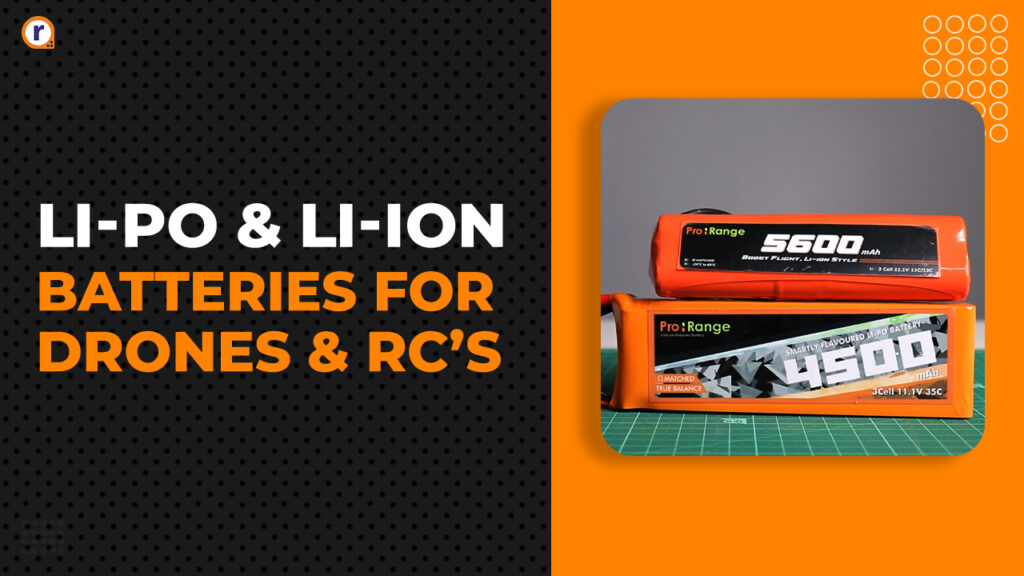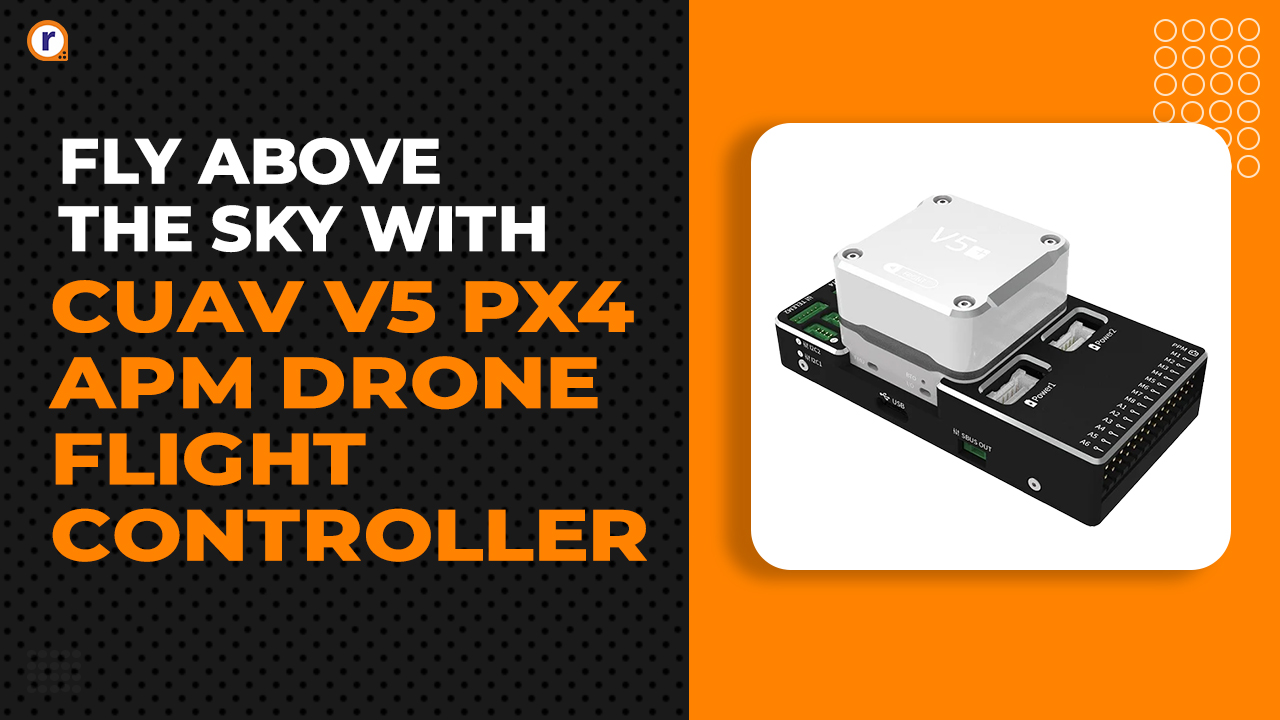How to choose Li-Ion and Li-Po Batteries for drone and RC- Features, Comparison.
Hey everyone! Are you confused to choose between Li-ion and Li-Po batteries for your Drones and RCs? In this Blog, we’ll break down the differences, features, and best uses for

Hey everyone!
Are you confused to choose between Li-ion and Li-Po batteries for your Drones and RCs? In this Blog, we'll break down the differences, features, and best uses for each type, helping you make the best choice for your Drone and RC needs.
Let’s dive right in!
We've already made a detailed blog on Pro Range Lithium-ion batteries' features, lineup, variety, and making process. View it here-https://robu.in/how-choose-lithium-ion-battery-for-drone-pro-range-lithium-ion-batteries-for-drones-rc/
let’s start with Differentiating Li-ion and Li-Po Batteries
What’s the Difference Between Li-ion and Li-Po Batteries?
Li-ion Battery:
A lithium-ion battery is a rechargeable battery that gained popularity in the early 1990s. It consists of three main components: a positive electrode, a negative electrode, and a liquid electrolyte between them. Most lithium-ion batteries also include an electronic controller to regulate power and prevent overheating or explosions. They used in wide range of application rather than drone and RCs like they are used in portable devices like camera, music player and even in smartphones
Check out the pro range Li ion Batteries -https://robu.in/product-category/batteries/batteries-batteries/drone-battery-pack/

Li-Po Battery:
The chemical electrolyte is the primary distinction between lithium-polymer and lithium-ion batteries. The electrolyte of Li-Po batteries is not a liquid. Alternatively, it could be a gel-like material, a porous chemical combination, or a dry solid. Modern laptops and electric vehicles are most likely to use the gel-like electrolyte.
Check out the Li Po Batteries- https://robu.in/product-category/batteries/batteries-batteries/lithium-polymer-battery-packs/

Is One Better Than the Other?
There are advantages and disadvantages to both lithium-ion and lithium-polymer batteries.

Lithium-Ion Batteries Pros and Cons:
Pros:
- High energy density
- No memory effect
- Lower cost than lithium-polymer
- Efficient energy storage
Cons:
- Low C rating
- Less Flexibility
- Suffer from aging
- Risk of combustion if the barrier between electrodes is breached
Lithium-Polymer Batteries Pros and Cons:
Pros:
- Sturdy and adaptable in dimensions and form
- Lightweight with a low profile
- Lower chance of electrolyte leakage
Cons:
- More costly to manufacture
- Lower energy density
- Shorter lifespan compared to lithium-ion
What Are the Features of Pro Range Li-ion Batteries and Li-Po Batteries?
- Energy Density: Li-ion batteries provide high energy density, while Li-Po batteries provide low energy density. i.e. it store more charge than Li po.
- Usable Voltage: Both battery cells have the same usable voltage range, from 3V to 4.2V.
- Flexibility: Li-ion batteries are less flexible in shape and size, whereas Li-Po batteries offer more flexibility.
- Weight: Li-ion batteries are lighter in weight compared to Li-Po batteries, which are comparatively heavier.
- Cost-Effectiveness: The cost of Li-Po batteries is higher compared to Li-ion batteries, making Li-ion a more budget-friendly option.
- Charging Duration: Li-ion batteries have a longer charging duration than Li-Po batteries. Both types have the same charging temperature range of 0 to 40 degrees Celsius.
- Operating Temperature Range: Li-ion batteries operate efficiently from –20 to 60 degrees Celsius.
- Lifespan: Both types of batteries have a long lifespan. But li ion have more life than li po in numbers li ion battery can last 3-5years. or 300-500 charge cycle.
- Current Discharge Rating (C Rating): Li-Po batteries have a higher current discharge rating compared to Li-ion batteries. This is crucial for high-end applications where current spikes can suddenly increase, like in racing drones or racing RC cars. If your use case does not involve these high-end applications, then Li-ion batteries should be sufficient for your needs.
- Current Capacity: Li-Po batteries can provide more current than Li-ion batteries.
- Capacity Retention: Li-ion batteries lose actual charging capacity over time, whereas Li-Po batteries retain their charging capacity better.
- Customization: Customizing Li ion battery according to need is easy compared to Li Po.
- Voltage stability: li on provide more constant and stable voltage supply than li po
How to Select the Proper Battery?
- Voltage Requirement: Determine the voltage your application requires.
- Current Requirement: Assess the current needs of your device.
- Battery Weight: Consider the weight of the battery.
- Battery Size: Ensure the battery fits your device's size constraints.
- Battery C Rating: Check the current discharge rating.
- Battery Capacity: Choose a battery with the appropriate capacity for your use.
- Application Environment: Know the environment where the battery will be used—outdoor, air, ground.
And if you’re looking for a battery for a drone, also consider:
- Weight of the Drone: Know the total weight of the drone.
- Thrust Calculation: Calculate the thrust required.

Still haven't got the answer? It might not be about which battery is best overall, but which is better for your specific use. Both batteries have their pros and cons; it all depends on what you need.
So, there you have it! A comprehensive look at Li-ion batteries and Li-Po batteries, and how to choose the right batteries for your needs.
Conclusion
In conclusion, selecting the right battery for your drone or RC device involves carefully considering various features such as energy density, C rating, flexibility, weight, cost, lifespan, and energy conversion. Li-ion and Li-Po batteries each have their distinct advantages and drawbacks. Li-ion batteries offer high energy density, cost-effectiveness, and longer lifespan, making them suitable for general applications and high-torque needs. On the other hand, Li-Po batteries provide higher current discharge, flexibility in shape, and lightweight options for smaller devices, ideal for high-speed applications like racing drones and RC cars.
simply if you're into high-speed racing or demanding RC activities, go for Li-Po batteries—they deliver more power and fit in smaller spaces, perfect for pushing limits. For everyday drone flights and longer run times with steady performance, Li-Ion batteries are your best choice. It all depends on what you need for your RC or drone adventures!
In the end, the optimal option is determined by your unique needs and use scenario. By understanding the characteristics and performance of both battery types, you can make an informed decision that ensures optimal performance for your drone or RC device.
For more detailed insights, check out our related video and comprehensive blog linked in the description. Thank you for reading, and we hope this guide has been helpful in your battery selection process.
Check out variety of Batteries - https://robu.in/product-category/batteries/batteries-batteries/
Videos-https://www.youtube.com/@RobuInlabs
Related blog-https://robu.in/lithium-ion-battery-vs-li-po-battery/






